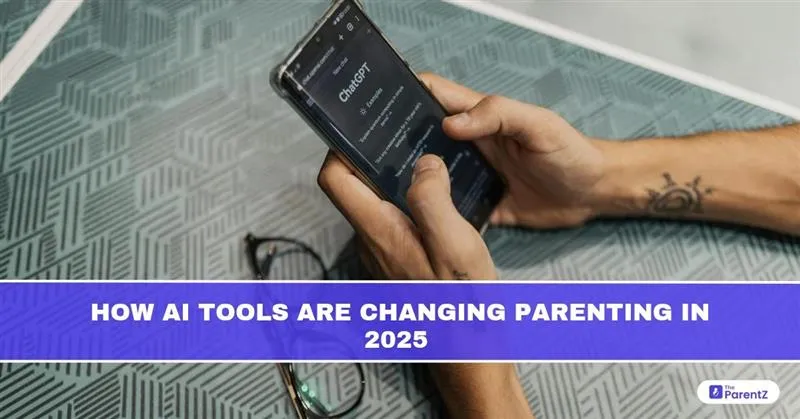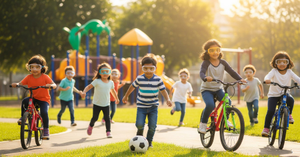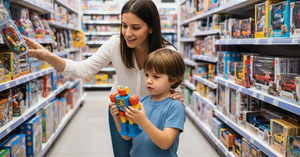It's 3 AM, and your toddler is crying again. Instead of frantically googling "Why won't my child sleep" for the hundredth time, you whisper to your phone, and an AI assistant instantly analyzes your child's sleep patterns, suggests gentle techniques, and even plays specific sounds that have worked for other kids with similar temperaments.
This isn't science fiction. This is Tuesday night in 2025.
Parenting today looks nothing like it did even five years ago. We've gone from calling our moms in a panic to having AI helpers that know our kids' schedules better than we do. Smart baby monitors now tell us when our babies will wake up before it happens. AI homework helpers change their teaching style to match how our teenagers learn best.
But don't think this is some perfect parenting world. This whole AI thing brings its own mess of problems and worries that keep parents up at night.
Getting Everyone Ready: Mornings Don't Suck as Much
Smart home systems wake up our kids with light that slowly gets brighter, making those awful Monday mornings easier. Voice helpers create morning checklists that kids actually follow, turning "Did you brush your teeth?" into a game.
Parents use AI apps to plan breakfast based on what's in the fridge and what the kids can actually eat. No more standing in the kitchen at 7 AM with no clue what to feed a picky eater.
But here's the problem: when the internet goes down or the app breaks, some families completely fall apart. Kids who always had AI helping them sometimes can't remember basic stuff without their devices.
Homework Time: Where Things Get Messy
AI homework helpers have gotten crazy good. They explain tough math problems, help with research, and give writing tips as good as teachers used to give. Many parents love having a backup when their kid asks for help with subjects they haven't touched since high school.
But the bad part is really bad. Some kids can't think for themselves anymore without AI help. Teachers see students who can't solve problems on their own, and parents worry their children aren't really learning, just getting better at asking AI for answers.
Feeding the Family: AI Tries to End Mealtime Wars
Smart kitchen apps look through our pantry, think about what each person likes and can't eat, and suggest meals everyone might actually eat. Some AI tools even look at photos of what your child ate at school and change dinner ideas based on that.
The biggest help is AI recipe changing. Got a kid who hates vegetables? The AI suggests sneaky ways to add healthy stuff to foods they already like.
But we're getting so obsessed with tracking food data that some parents feel anxious when they can't log every bite. Kids are starting to think mealtime is about scanning and tracking instead of talking with family.
Sleep: Finally Getting Rest
If there's one area where AI has been life-changing, it's sleep. Smart baby monitors track breathing, temperature, and even guess when your baby will wake up. AI sleep coaches learn your child's unique patterns and suggest personal strategies.
Parents go from months of no sleep to actually getting rest. Children who had bedtime anxiety now have AI friends that tell personal stories made just for them.
However, some parents have become so dependent on AI sleep tracking that they panic when the technology breaks. Children are growing up with data-driven sleep routines that might not prepare them for real-world situations.
Feelings and Emotions: The Biggest Change
Really good AI tools can spot signs of anxiety or depression in children before parents even notice. AI friends help kids practice difficult conversations and work through social anxiety. These tools have been amazing for parents of children with autism, ADHD, or social anxiety.
But here's what keeps us up at night: are we raising kids who go to AI for emotional support before they come to humans? Some children are getting closer emotionally to AI friends than to family members.
Safety and Watching: Always Knowing Where They Are
Smart home systems can tell when a child has left safe areas or spot dangerous activities. AI apps track kids' digital footprints, warning about cyberbullying or bad content. Location tracking tells parents about traffic on their teenager's route home.
The peace of mind is incredible. But this level of watching creates new problems. Teenagers feel like they have no privacy, and some parents get addicted to watching their children's every move.
The Money Part Nobody Talks About
AI parenting tools range from free apps to premium services costing hundreds monthly. The pressure to keep up with other families who have the latest tools is real. Some parents feel guilty when they can't afford what other families swear by, creating a new kind of parenting inequality.
Finding Balance in All This Craziness
AI in parenting isn't going anywhere. The question is how we use it wisely. The most successful families see AI as a helpful assistant, not a replacement for human judgment.
This is where thoughtful AI parenting tools make a difference. Apps like TheParentZ Baby Growth & Health Tracker understand that parenting isn't about perfect solutions but reliable support when you need it. Their AI Parenting Partner, Misha, works alongside parents, not replacing parental instinct and connection.
Whether you're a new parent figuring out sleep patterns or dealing with teenage emotions, having an AI helper that understands your situation can make all the difference. The key is finding tools that make parenting better, not more complicated.
Conclusion
The happiest families use AI for information and to make things better but rely on human judgment for emotional decisions. They teach their children to question AI suggestions rather than just accept them. Most importantly, they keep family traditions that don't involve any technology.
The families having trouble are those who either use AI for everything or reject it completely out of fear. Both extremes leave parents feeling alone.
Our children are growing up as the first AI natives. They'll become adults in a world where artificial intelligence is part of everything. Our job isn't to keep them away from this reality but to help them have healthy relationships with technology while staying human.
The future of parenting isn't about perfect AI solutions. It's about raising children who can live in a world where technology and humanity work together, and that starts with how we show that balance in our own homes today.








Be the first one to comment on this story.